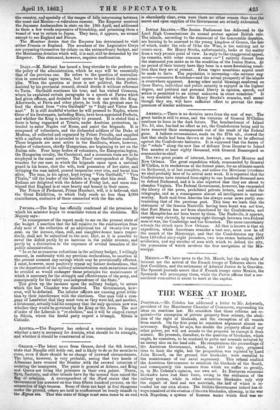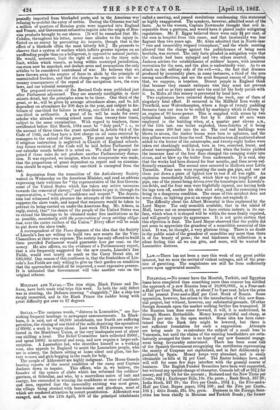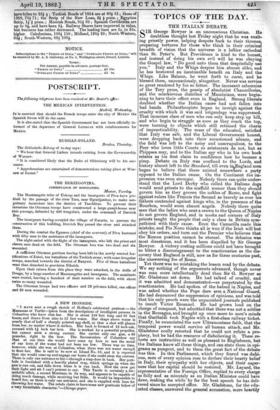THE WEEK AT HOME.
PoniTicaL.—Mr. Cobden has addressed a letter to Mr. Ashworth, president of the Manchester Chamber of Commerce, expounding his ideas on maritime law. He considers that three reforms are re- quired--the exemption of private property from seizure, the aboli- tion of the right of blockade, and the exemption of all vessels from search. On the first point he considers argument almost un- necessary. England, he says, has double the property afloat of any other power, yet will not accede to the proposal to exempt it from seizure. He proceeds, therefore, to the question of blockades, which ought, he conceives, to be confined to ports and arsenals invested by an enemy also on the land side. He recapitulates the proceedings of the American Government, which, in 1860 he says, proposed thus to limit the right, but the proposition was rejected by Lord John Russell, on the ground that blockades were essential to the maintenance of our naval supremacy. This refusal enabled the American Government to establish the blockade of the South, and consequently this measure from which we suffer so greatly, is, in Mr. Cobden's opinion, our own act. In European countries blockades have losttheir force, owing to the extension of the railway system, while in other countries blockades only stop the export of food and raw materials, the half of which is in- tended for our own shores. The British Government indeed has al- ways connived at the evasion of its own blockades, allowing, in the war with Napoleon, a ystem of licenses Ruder whirl Mod wse re.
peatedly imported from blockaded ports, and in the American war refusing to prohibit the entry of cotton. Daring the Crimean war half a million of quarters of Russian grain were imported into England and France, and Government refused to inquire into the origin of Rus- sian products brought to our shores. [It will be remarked that Mr. Cobden, throughout his letter, never once alludes to the injury in-
flicted on an enemy by preventing his imports, though that is the effect of a blockade often the most bitterly felt.] He proceeds to
observe that a system of warfare which inflicts greater injuries on an unoffending people than on a belligerent, is opposed to natural justice. He would, moreover, limit the right of search to the three mile limit, within which vessels, as being within municipal urisdiction, can even now be searched, and declare arms and ammunition the only articles to be considered contraband of war. He believes that we have thrown away the sceptre of force to abide by the principle of uncontrolled freedom, and that the changes he suggests are the ne- cessary consequences of the repeal of the navigation laws, the corn laws, and our colonial monopoly. The proposed revisions of the Revised Code were published just after Parliament adjourned. They are scarcely intelligible in their minute detail, but the principles seem to be these. One third of the grant, or 4s., will be given by average attendance alone, and 8s. left dependent on attendance for 200 days in the year and subject to for- feiture of one-third for failure in writing, one-third in reading, and one-third in arithmetic. A grant of 5s. will be made for every scholar who attends evening school more than twenty-four times, subject to the same examination. With regard to teachers, those certificated before 31st March, 1864 must be "duly paid," i. e., to the amount of three times the grant specified in Article 64-5 of the Code of 1860, and they have a first charge on all sums received by managers to the extent of this grant. The grant may be withdrawn if religious instruction is neglected in Church of England schools. Any future revision of the Code will be laid before Parliament for one calendar month before it is acted on. We shall be greatly sur- prised if these rules do not produce another Parliamentary discus- sion. It was expected, we imagine, when the compromise was made, that the proportions of grant dependent on report and on examina- tion should be equal, whereas only one-third is exempted from the test.
A deputation from the committee of the Anti-slavery Society waited on Wednesday on the American Minister, and read an address
expressing their welcome for "the representative of the first Govern- ment of the United States which has taken any active measures towards the removal of slavery," and their desire to pay it, through its representative, a "tribute of confidence and respect.' The deputa- tion had witnessed with pleasure the attempts of the Government to suppress the slave trade, and hoped that measures would be taken to prevent its being carried on under the American flag. Mr. Adams, in reply, stated, that" the desire of the people of the United States was to extend the blessings to be obtained under free institutions as far as possible, consistently with the preservation of every existing obliga- tion, over the entire surface of the Union." Every effort will be made to put down the slave trade.
A correspondent of the Times disposes of the idea that the Society of Lincoln's Inn are willing to build two new courts for the Vice- Chancellors at their own expense. The society has only offered to build them provided Parliament would guarantee four, per cent, on the money. He also affirms, on the evidence of a Parliamentary report, that a site frequently suggested for the new courts, Lincoln's Inn Fields, would cost nearly as much as the Carey Street site, or 680,000/. One reason of this costliness is, that the freeholders of Lin- coln's Inn Fields are only willing to give up their garden on condition that the approaches should all be improved, a most expensive process. it is intimated that Government will take another vote on the original scheme.
MILITARY AND NAVAL.—The iron ships, Black Prince and De- fence, have both made trial trips this week. In both the only defect was in steering, the Defence steering "sluggishly," like a ship too deeply immersed, and in the Black Prince the rudder being with great difficulty got over to 27 degrees.
Soot:L.—The ominous words, "distress in Lancashire," are fur- . nishing frequent headings to newspaper announcements. In Black- burn, it is said, out of 60,000 inhabitants, one fourth are suffering privation, the closing of one third of the mills depriving the operatives of 60001. a week in wages alone. Last week 8974 persons were re- lieved in the Blackburn Union, at the very inadequate cost of about. one shilling a head. The Relief Committee have collected 25001., and spent 1600/. in oatmeal and soup, and now require a larger sub- scription. A Lancashire lad, who describes himself as a working man, also appeals to England to assist the Lancashire people, who are in misery, the fathers sitting at home silent and glum, the fac- tory women and girls begging in the roads for help.
The people of Aldershott are highly. indignant. The Horse Guards hearing reports of the moral condition of the camp sent Captain Jackson down to inquire. This officer, who is, we believe, the founder of the system of clubs which has reformed the soldiers' garrison, at Gibraltar, and who, by a marvellous union of tact and energy, has succeeded in winning the confidence at once of martinets and men, reported that the immorality existing was most gross, the village being stocked with beer-houses and gin-shops, most of which are rendered attractive by covert prostitution. Aldershott was enraged, and, on the 11th April, 300 of the principal inhabitauts
Law.—There has not been a case this week of any great public interest, but we note the revival of violent outrages, and of theprae- tice of garotting. The magistrates are still far from sufficiently severe upon aggravated assaults.
Frbrearcren.—No sooner have the Moorish, Turkish, and Egyptian loans been completed than something more than rumour has notified the approach of :a new Russian loan of 10,000,0001., in a Four-and- a-Half per Cent. Stock, at 85, or about 7 to 9 percent. below the price of the present Four-and-a-Half per Cent. Stock of Russia. Some opposition, however, has arisen to the introduction of this new finan- cial project, but without, however, any substantial grounds. Of other foreign demands upon the market nothing further has transpired. If the Russian loan does come forward, it will, it is understood, be through Messrs. Rothschilds. Money keeps plentiful and cheap, at from 21 per cent. in the open market. Some idea has been enter- tained that the Bank rate might _ be lowered, but there is not sufficient foundation for such a supposition. Attempts are being made to re-introduce the subject of a small loan to Venezuela, but until the claims of the existing bondholders are satis- factorily arranged for there is no hope of any new financial engage- ment being favourably entertained. There has been some talk of the Spanish Government recognising the certificates representing the moiety of Coupons not capitalized, and in fact deliberately re- pudiated by Spain. Money keeps very abundant, and is easily obtainable on bills at 21 per Cent. The Easter holidays have, and will still for some few days interfere with the general course of business. The English Funded Securities have been well supported, but without any special change of character. Consols left off at 93i I for money, and 93i 94 for the account; Reduced and the New Three per Cents., 921 f ; Exchequer Bills, 18s. 21s. prem. ; Bank Stock, 237 39; India Stock, 227 29; the Five per Cents., 1081 1; the Five-and-a- Half per Cent. Rupee paper; 1081 109; and the Five per Cents., 103 1; ditto Bonds, 26s. 30s. prem. Business in the Foreign Secu- rities has been chiefly in Mexican and Turkish Bonds ; the former
called a meeting, and passed resolutions condemning this statement \ as highly exaggerated. The speakers, however, admitted most of the \ facts. As to the women, Captain Newcombe thought that evil in- separable from a garrison, and would have it placed under mitigating; regulations. Mr. F. Egger believed there were only 2 per cent. of the men in hospital front this cause, and that immorality was less flagrant than two years ago. Mr: Allen admitted that in North-lane "vice and immorality reigned triumphant," and the whole meeting allowed that the charge against the publiehouses of being mere brothels, was correct. 'rhe only facts pleaded in mitigation were that the church had been enlarged and two others erected. Captain Jackson advises the establishment of soldiers' homes, with innocent recreation for the men, and the plan is undoubtedly wise. As to an attack on the military side of the evil—viz., the fact that diseases
produced by immorality place, in many instances, a third of the men among non-effectives, and are the most frequent causes of unvaliding that, we suppose, is hopeless. Decent people in England think that because they cannot extirpate vice they must not prevent disease, and so as they cannot save the sonnet the body perish with it. In Malta all this misery is prevented by local laws. Two explosions have occurred during the week, one of them of singularly fatal effect. It occurred in the Millfield Iron works at
Prestfield, near Wolverhampton, where a forge of twenty puddling furnaces turn out iron to be rolled by machinery which is driven by an engine of 80 horse-power. This is supplied with steam by two cylindrical boilers about 20 feet by 8. About 40 men were employed in the building when, at a quarter past eleven A.m., of the 15th inst. one boiler exploded, three-fourths of it being driven some 200 feet into the air. The roof and buildings were blown to atoms, the timber beams were torn to splinters, and the iron pillars were rent from the roof. The molten iron all scattered about added to the horror of the catastrophe, and twenty-eight bodies were taken out shockingly mutilated, torn in two, scorched, burnt, and almost unrecognizable. It is supposed that when the boiler yielded the immense heat of the four flues changed the escaping water into steam, and so blew up the boiler from underneath. It is said, also that the works had been disused for four months, and then never suf- ficiently examined. The second case occurred in Holborn near Little Turnstile. Four men were repairing the main gas pipe, and one of them put down a piece of lighted tow to test if all was right. An explosion immediately followed, which blew tip two lengths of gas pipe, one of the pieces being driven over the housetops into Lincoln's- inn-fields and the four men were frightfully injured, one having both
his legs torn off, another his chin shot away, and the remaining two being in a dangerous condition. The cause of this accident does not seem clear, as lighting gas at an escape does not explode it.
The difficulty about the Albert Memorial is thus explained by the Lord Mayor. The only monolith available, that in the island Of Mull, turns out on measurement to have certain indents in its sur- face, which when it is shaped will be within the mass finally required, and will greatly impair its appearance. It is not quite certain that this objection is final. The Lord Mayor observed that the public did not seem to appreciate the grandeur of a monolithic memorial of this
kind. It was, lie thought, a very glorious thing. There is no doubt in the public mind of the grandeur of monoliths any more than there is of the beauty of gems; the real hindrance to collections is a silent feeling that all we can give, and more, will be wanted for Lancashire distress. have fallen to 325 4; Turkish Bonds of 1854 are at 805 81; those of 1858, 704 71; the Scrip of the New Loan, 24 4 prem.; Egyptian Scrip, 14 4 prem.; Moorish Bonds, 915 92; Spanish Certificates are up to 85, and have been 85. Railway Shares have improved in value, but business has rather decreased. The lending lines are 5s. to 25s. higher. Caledonians, 1095 110; Midland, 1285 29; North-Western, 944; South-Western, 995 1004.
































 Previous page
Previous page